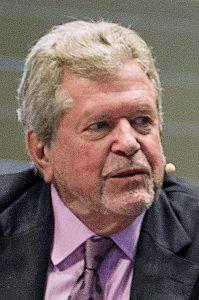
Since 1993, Geoffrey Kemp, senior director of Regional Security Programs at the Center for the National Interest, has hosted the Middle East Update at Chautauqua Institution. As “facilitator” of the lecture, Kemp offers an introduction and then invites guest speakers to discuss the topic in depth.
“We’ve been doing this every year since 1993 (and) that was the year that the Oslo Accords (happened),” Kemp said. “Chautauqua always had an interest in the Middle East, but it was decided after Oslo that there was such an interest in the subject amongst the community that we might want to do (a Middle East Update) every year.”
At 3:30 p.m. Monday, August 6, in the Hall of Philosophy, Kemp will be joined by Nikolas Gvosdev, professor of national security affairs at U.S. Naval War College, for the first of two Middle East Updates this season. Since Week Four was devoted to Russia, the first update will focus on Russia and its interests in the region.

Since the end of the Cold War in 1991, Gvosdev said Russia’s interventions in the Middle East were revamped in the mid-2000s, when it started forming partnerships with countries like Turkey and Israel over energy markets. While Russia’s interests in the region continued to build from there, Gvosdev said it “took off” after the Arab Spring in 2011.
Since then, Russia has established a number of partnerships with Middle Eastern countries regarding energy resources, defense systems and other industries. Through the lecture, Gvosdev hopes Chautauquans will see that the entire Russian state benefits from these partnerships, not just President Vladimir Putin.
“There’s almost an assumption, particularly in the United States, that (is): ‘Well, if Putin were to be removed or (there) was someone else in (his) place, then Russia wouldn’t be doing these things,’ ” Gvosdev said. “Instead, it’s becoming more important to the Russian state (as a whole). You (can) look at what they’ve done… They’re intervening in the Middle East (and) spending resources because they expect longer-term payoff.”
Gvosdev used Russia’s economy as an example of the country’s interest in the Middle East. He said Russia traditionally had an antagonistic relationship with OPEC, but now has successfully reoriented that relationship into a partnership.
“Energy is the lifeblood of the Russian economy,” Gvosdev said. “It is the main source of revenue for Russia at this point. These interventions have had the impact of bringing Saudi Arabia, and to a lesser extent Qatar and the United Arab Emirates, into (an) understanding that … they have these shared interests in stabilizing energy markets.”
Gvosdev said Russia’s involvement is also beneficial because it keeps Middle Eastern countries economically invested in other areas of importance, like the defense industry.
“Syria has probably been one of the most cost-effective advertisements for the Russian defense industry,” Gvosdev said. “You (can) look at the uptick in orders, particularly from other Middle Eastern countries, since the Syrian intervention.”
He said since Russia’s 2015 intervention in Syria, various countries have begun to understand what Russian technology and weapons can do. Middle Eastern nations like Turkey, also a NATO ally, want these defense systems for their own protection and are unsure that their “Western allies” will provide them, he said.
Gvosdev said Russia’s economic interest is an important reason for its interventions in the Middle East, and many people have not taken the time to focus on it.
“There’s a lot more to (Russia’s interventions) than meets the eye, and don’t fall into the trap of thinking ‘this is all ex-KGB officers’ search for glory on the world stage,’ ” Gvosdev said.
Putin is the leader of an autocratic nation, and he thinks Russia must assert itself on the world stage, Gvosdev said. Yet he wants to discuss how Russia’s involvement in the Middle East runs deeper than one political figure flexing his muscles on the world stage.
Like Gvosdev, Kemp hopes people will understand that the situation with Russia in the Middle East is more complex than it appears.
“If Putin were to disappear tomorrow, you wouldn’t have Russian energy companies scratching their heads and saying, ‘Well, now that (Putin’s) gone, we have a completely different vision for how Russian energy should be marketed in the world,’ ” Gvosdev said. “That’s not going to change.”




